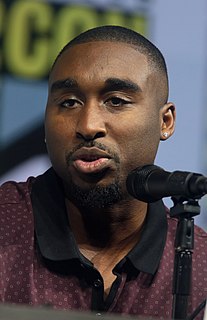A Quote by Jerrod Carmichael
I think people respond to truth. 'Straight Outta Compton' made $60 million over the weekend, right? That's not just a black audience. 'Empire' grew every single week. That's not just a black audience. Black culture is American culture, you know what I mean? They're becoming more and more one in the same.
Related Quotes
There's no reason why you can't say "August Wilson, playwright" even though all of my work, every single play, is about black Americans, about black American culture, about the black experience in America. I write about the black experience of men, or I write about black folks. That's who I am. In the same manner that Chekhov wrote about the Russians, I write about blacks. I couldn't do anything else. I wouldn't do anything else.
I did not disregard my culture, if I did, it was the white American culture, and I accepted my true culture, when I accepted Mohammed Ali, because this is a black name, Islam is the black man's religion, and so I would like to say, that I would like to clarify that point that I reclaimed my real culture, and that's being a black man and wearing a black name with a black body, and not a white name, so I would never say that I didn't disown my culture.
'Smart Funny and Black' is basically a live black pop culture game show that I created. We have a live band. We have two contestants that we call 'blacksperts.' They come on stage and compete in games that I've created that test their knowledge of black culture, black history, and the black experience.
As a black person on the outside, because there's so much black art and so much of black people's work circulating, so many people imitating what black people do, you would think that there'd be more black people on the business side. It didn't cross my mind that every label head, for the most part, is a white guy.
I would say I'm black because my parents said I'm black. I'm black because my mother's black. I'm black because I grew up in a family of all black people. I knew I was black because I grew up in an all-white neighborhood. And my parents, as part of their protective mechanisms that they were going to give to us, made it very clear what we were.
I think that we need more economic-based solutions to the problems afflicting the Black community, and I think that that's a way to redefine affirmative action. I grew up with poor white people in West Virginia, and I know there's a culture of poverty. I know that I've seen white people perform exactly the same pathological forms of behavior as Black people do when they're systematically deprived, whether it's getting pregnant, doing drugs, dropping out of school, whatever we're talking about. I think that we should have affirmative action for poor white people too.
This is more in regards to celebrities. What we've got to understand is that we are the influencers of the hip-hop culture, the black culture. We are the way out, you feel what I'm sayin'? As far as who we look to and where we get stuff from - hip-hop culture is influencing the world, really, but especially the black communities.
"Black culture" is ready for whatever. I sense some momentum and excitement around black artists (especially in comedy, which is where most of my own art resides), really pushing the bounds of what has generally been expected as black. I don't think it's a revolution so much as an exposure of what has always been there, and now that the production and distribution means are more accessible, people can more easily find each other.




































